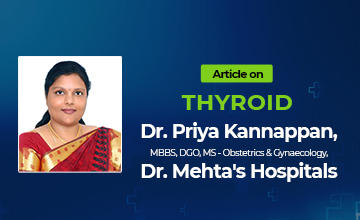Weight loss by simple changes in the lifestyle (more physical activity) or just change in the composition without change in BMI can cause correction of thyroid level and regularisation of cycle. People with autoimmune thyroid disease are at more risk for acquiring COVID-19. COVID infection may lead to short term and reversible thyroid dysfunction. Adequate management of patient with thyroid disease during pandemic is essential and can be done
using telemedicine.
People with COVID infection can have irregular periods(30%), heavy menses bleed (25%) or premenstrual syndrome. Menses problem are more in severe illness (34%) rather in mild illness(19%). All these changes are related to hormonal imbalance in COVID affected women or stress and anxiety due to pandemic could be the reason
Menstrual problems are common with thyroid dysfunction. They can have irregular menses or heavy flow. Obese women are at increased risk of developing type 2 DM, cardiovascular disease, hyperlipidemia, infertility, PCOS and menstrual dysfunction. Obesity especially abdominal obesity and rapid weight gain causes irregular menses. Being overweight, the body produces an excess amount of estrogen which results in heavy menses and ovulation may not occur resulting in irregular cycle.
Thyroid gland is a butterfly shaped gland in front of the neck, it makes the thyroid hormones. Thyroid hormone regulates basal metabolism, thermogenesis and play an important role in fat and glucose metabolism, food intake and fat breakdown. Hypothyroidism ( low thyroid hormone) is associated with decreased metabolic rate and is correlated with a higher BMI and a higher prevalence of obesity. In India among the obese
women 33% had overt hypothyroidism.
Obesity and hypothyroidism are common clinical conditions that have been linked together. According to the common perception, hypothyroidism is held responsible for obesity. Recent studies show excess weight may be behind the slowing down of thyroid function and obesity increases the risk of thyroid cancer.
High leptin( adipocyte hormone seen in obesity) levels plays a role in hyperthyrotropinemia(increase in TRH hormone of brain) of obesity and subsequent hypothyroidism. The main action of leptin is to report the amount of fat to the brain, leading to decrease in appetite and food intake. Leptin stimulates the brain causing more TRH and TSH. Leptin enhances the inflammatory cytokines from fat tissue causing less production of thyroid hormones by autoimmune destruction of thyrocytes ( thyroid producing cells)
Artical by
Dr Priya Kannappan,
Consultant- Obstetrics & Gynaecology,
Dr Mehta’s Hospitals

